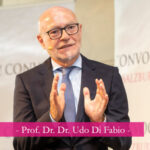In the C! edition New Global Alliances (2021) Corinne Flick writes:
“It is already becoming apparent that the road towards an ideal of universal cooperation might also be one strewn with conflicts to come. It is already clear that the unilateral world order of the last decades no longer applies. But it is far from clear as to what will replace it. Is our world now bipolar or rather multipolar? Or are we on the road to a “post-hegemonic” age in which the geopolitical world no longer revolves around historic “poles”? Our difficulty in finding an answer to these questions is already proof enough that something new is emerging. … The risk of our world falling apart is increasing.”
Just one year later, this forecast becomes reality. The war in Ukraine marks a turning point. The world after the war will never be the same. Read statements of the C! Thinkers on the question:
Is our world order falling apart?
Reimperialization and Reterritorialization

Today we can discern trends towards the establishment of new imperial orders after the end of the Cold War and under the aegis of a new multipolarity, whether in Turkey’s neo-Ottoman policies, which are accentuated in historical, political, and religious terms in the repurposing of the Hagia Sophia, or in Russia’s alignment with its imperial past … In these contexts, imperiality not only means the politics of memory, but also acquires a very concrete dimension in territorial claims and their associated interventions, such as in Crimea, Eastern Ukraine, Syria, and Libya. (C! Edition, 2021)
It is quite obvious that we are currently dealing with a very aggressive “politics of history”, be it in the case of Putin, Erdoğan, or in China. There is, if you will, an ideological or historical-political imperialism that continues to be of great importance even after the end of the classic empires. (C! Podcast, 2020)
The New Era of Multipolarity

A lot has changed in the last few years. Certain powers have risen and certain forces have been unleashed. The post-Cold War era led by the US and a US-led international community is still largely behind us. (C! Edition, 2021)

The more the United States jeopardizes its hegemonic position, and the longer Europe remains incapable of establishing itself as an independent global power, the more significantly the balance of geopolitical power mechanisms will shift. (C! Edition, 2021)
Since Putin came to power and since Erdoğan adopted his neo-Ottoman, autocratic policies in Turkey, the number of anti-Western players has increased. The multilateral world has become a multipolar world. (C! Edition, 2021)
Are the world's institutional arrangements losing their binding force?
Udo Di Fabio: The development of a normatively and institutionally integrated form of sovereignty has been approaching its limits for a long time, however. What we are experiencing today is a rebellion against this system—a serious “counterrevolution”. In this struggle, new geopolitical alliances are emerging. (C! Edition, 2021)

[The challenge for the world order lies] in what it means […] if democratic progress is undermined by power shifts in global governance. The rise of autocratically governed countries, such as China, limits the democratic influence on IOs and can thus in the long term lead to the decline of global democracy. Autocracies primarily want to expand their national sovereignty. (C! Edition, 2021)
World peace is a fragile public good that can best be protected and strengthened through the cooperation and active contributions of international and European institutions. (C! Edition, 2021)

This war is a turning point for Europe. Within the span of a few days, the EU has become a serious geopolitical player. (C! Special Podcast, March 2022)
It has become clear hat we need a strong commitment to NATO and the EU to protect European citizens effectively. (C! Special Podcast, March 2022)
War in Ukraine as a “Point of No Return”

The international order has fallen apart. We should change into damage control mode. The question is no longer whether we can reinstall the post-1989 order. The question is which new balance of power can be established without much further violence. (C! Special Podcast, March 2022)
The best outcome under the current conditions would perhaps be a return to the Cold War. But I’m not sure if we can really go back to even the Cold War balance of power because the response of the West, both of governments and the public, has been much more determined than most people and perhaps even the Russians expected. It will be difficult to, so to speak, climb off this horse. It will take considerable negotiations to even reach a Cold War situation right now. (C! Special Podcast, March 2022)

Since around 2010, we are observing a stagnation of globalization. We should now expect the division of labor to deepen within the blocs facing each other … All in all, this means that globalization as we know it is coming to an end. (C! Podcast Special, March 2022)

There was a notion of “change through trade”: the more you trade with Russia, the greater the interdependence, and this interdependency will prevent a military conflict. We no longer have this illusion. (C! Special Podcast, March 2022)
We now realize that we have to take precautions for contingencies that until recently we considered to be contingencies of the last century, namely the possibility that we might find ourselves in a military conflict. Ultimately, we have to see this as an opportunity to restructure things. (C! Special Podcast, March 2022)

